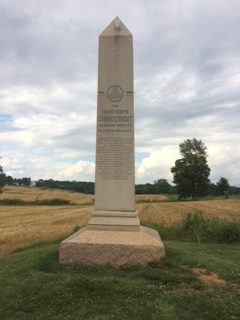Karl A. Bacon. An Eye for Glory. Zondervan, 2011.
I was excited to receive this book when I discovered that it is a novel about a soldier in the 14th Connecticut Infantry Regiment during the Civil War. When I teach Civil War Literature in school, I use an actual diary of a man who also served in the 14th Connecticut. The man was from Bridgeport, the state’s largest city then and now, as are many of my students. The soldier, William Hincks, would be awarded the Medal of Honor for his exploits at Gettysburg.
An Eye for Glory gives a first person account of a Michael Palmer of Naugatuck, Connecticut, about thirty miles north of Bridgeport. It includes letters written back and forth to his wife. It follows the course of the war as was seen by the 14th Connecticut and does it very well. I am certain that Bacon used various accounts including what he could find about Hincks.
The unit formed in the summer of 1862, so it missed some of the earliest battles, but it arrived in Maryland in September in time for South Mountain and Antietam. Palmer is there and tells it as he saw it—as eyewitnesses like Hincks did see it. The author includes some helpful maps.

14th Connecticut Monument at Antietam
Palmer goes on to Fredericksburg and Chancellorsville and then to Gettysburg. We get a sense of the frustration that many troops (not to mention President Lincoln) felt that their leaders were not taking advantage of situations and wasting lives.
Without giving too much away, Gettysburg changes Palmer. Not only does his side win a battle in the East, but he begins to think about what it means to kill other men. The brutal Battles of the Wilderness and Spotsylvania come alive. He also begins to understand what it really takes to win a war as Grant takes over the army.
The end is quite moving. Some readers might be familiar with “The Artilleryman’s Vision,” a Civil War poem by Walt Whitman. It is set after the war in the home of a veteran. In so many eloquent words, the soldier dwells on the things he has seen and realizes that his wife will never understand. There is a lot of truth in that.
I have a friend whose father served on a Navy ship in World War II. His vessel saw a lot of action in the Pacific. Every five years they would have a reunion. My friend’s mother did not like the reunions because she and many of the wives felt left out. Most of the shipmates never wrote each other or kept in touch other than for the reunions, but they would pick up like they were best friends who had been together the day before.
In An Eye for Glory, there is perhaps even a little more. Today we would probably say that Palmer had PTSD. The way he deals with it is remarkable, but it helps to cure him. And the reader has no problem believing it. This is a raw, action-filled war novel, but it really gets inside the mind of the soldier. It resembles the Civil War stories of Stephen Crane but with greater scope.
I do have one quibble with the book. It mentions “The Star-Spangled Banner” being the national anthem. It did not become the national anthem until 1931. The Hincks diary, for example, names sixteen songs the band accompanying the 14th played, none were “The Star-Spangled Banner.” The one patriotic tune he mentions was “The Battle Hymn of the Republic” which he calls “Glory, Glory, Hallelujah.”
Palmer and his friends are fictional, but many of the other characters in the 14th Connecticut were real people. One person mentioned quite a bit is Captain, later Major, Ellis. The first few leaders of the 14th were often absent because of injuries or other reasons. One was court-martialed. Ellis eventually would lead the 14th, but even before his promotion he was often the de facto leader.
While Palmer has a Springfield rifle, he notes that the men with Sharps rifles were more effective. That was the case in the war. The Sharps rifle could be loaded quicker. It was breech loaded rather than muzzle loaded. Men with these would pair up, one loading and one firing, and together they could get off two or three shots a minute while being more alert. Some of the story may seem like exaggeration, but I have read enough to know that it is not. If anything, Bacon, through Mr. Palmer, plays the violence down. But it is based on real events, and it does them well.